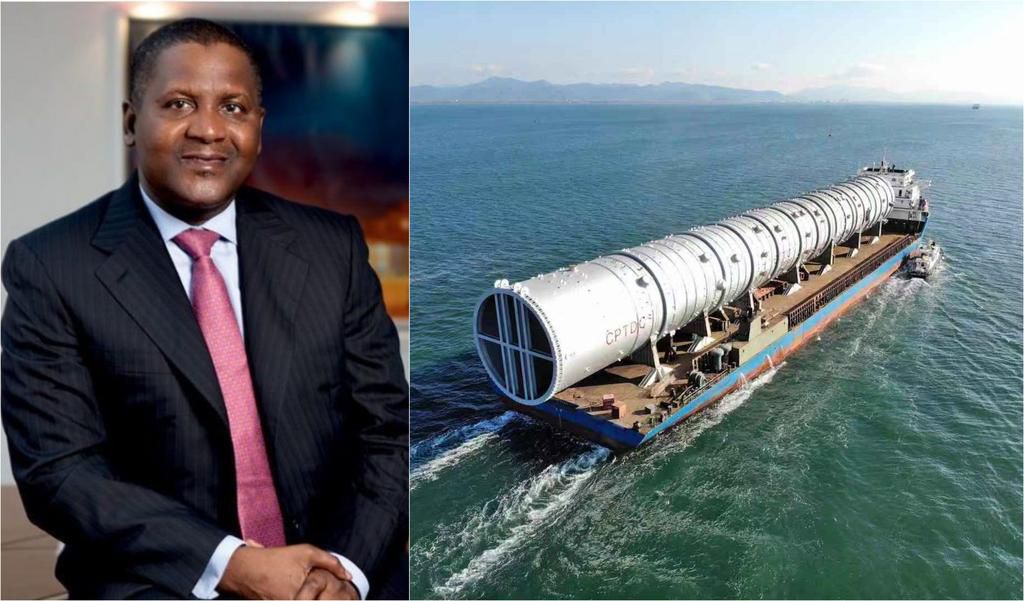The Dangote Petroleum Refinery has been cleared of allegations that it imported substandard petrol into Nigeria, following an independent investigation by a United Kingdom–based watchdog, Impact Investigators Platform (IIP).
The IIP, in a detailed report released on Friday, dismissed the claims as “technically inaccurate, commercially implausible, and unsupported by verifiable evidence.”
Reports had earlier suggested that a shipment of high-sulphur petrol was imported into the country by the refinery, sparking public concern. But IIP’s findings showed otherwise.
“Our independent review of shipping data, customs declarations, and refinery process documentation found no indication that the Dangote Refinery imported or sold finished Premium Motor Spirit (PMS) with sulphur levels above Nigeria’s approved limit of 50 parts per million (ppm),” said Raymond Neil, IIP’s lead investigator.
He explained that the cargo referenced in the reports was not petrol ready for retail sale but an intermediate feedstock—a raw material commonly traded among refineries worldwide for further processing.
Normal industry practice
“Our analysis confirms that the shipment being referenced was a blending component, not a finished petrol product,” Neil clarified.
“It was imported within the context of refinery optimisation and was never intended for direct distribution or public sale. The claim that Dangote Refinery imported dirty fuel into Nigeria is therefore misleading and inconsistent with both technical and commercial realities.”
The IIP noted that refineries in Europe, Asia, and America regularly import streams such as high-sulphur catalytic gasoline (HSCG) or straight-run naphtha to balance production yields. These inputs, once processed, are upgraded into ultra-low-sulphur fuels.
“This is normal industry practice,” Neil said. “It does not in any way imply that substandard or harmful fuel is being sold to consumers.”
The report further confirmed that all Dangote Refinery imports complied with rules set by the Nigeria Customs Service (NCS) and the Nigerian Midstream and Downstream Petroleum Regulatory Authority (NMDPRA), both of which monitor feedstock imports and quality assurance.
The refinery also operates under a free trade zone licence, meaning materials brought in must undergo refining before entering the domestic fuel market.
“Our review included verification of laboratory test results, refinery utilisation records, and inspection certificates filed with port authorities in the UK and Nigeria. None of the documents supported claims that petrol imported by the refinery was for direct local consumption,” Neil explained.
He added that the reported sulphur levels related only to intermediate-grade gasoline used for processing, not to fuel sold to Nigerians.
Warning against misreporting
Neil warned that misrepresenting technical details could undermine public confidence in the refinery at a time when Nigeria is trying to strengthen its domestic refining base.
“The Dangote project remains a strategic national asset. Public debate around it must be grounded in fact, not conjecture,” he said.
He urged Nigerian authorities to establish a rapid-response mechanism to verify refinery operations and product quality claims before misinformation spreads.
“Transparency is key. But transparency also requires responsible reporting and technical understanding of what the data means,” Neil said.
Beyond clearing the refinery of wrongdoing, the IIP commended it for what it described as a “proactive compliance culture.”
“Our review shows that every product stream leaving the Dangote Refinery is accompanied by a certificate of quality issued by an ISO-certified laboratory,” Neil revealed.
“These certificates are regularly submitted to the NMDPRA before any local dispatch. This is the kind of governance structure that should be encouraged, not vilified.”
The group added that Dangote’s internal audit systems align with standards applied by the European Refining Association and the American Petroleum Institute, reinforcing its commitment to delivering cleaner fuels that meet international benchmarks.
Neil concluded that the refinery was engaged in legitimate global trade practices, subject to regulation, and focused on producing ultra-low-sulphur fuels for the Nigerian market.
“The energy transition requires accuracy, not alarmism. Our findings clear the Dangote Refinery of the claims of importing dirty fuel. What we found instead is a refinery engaged in regulation-driven operations, committed to transparency, and positioned to reduce Nigeria’s dependence on fuel imports,” he said.
>

